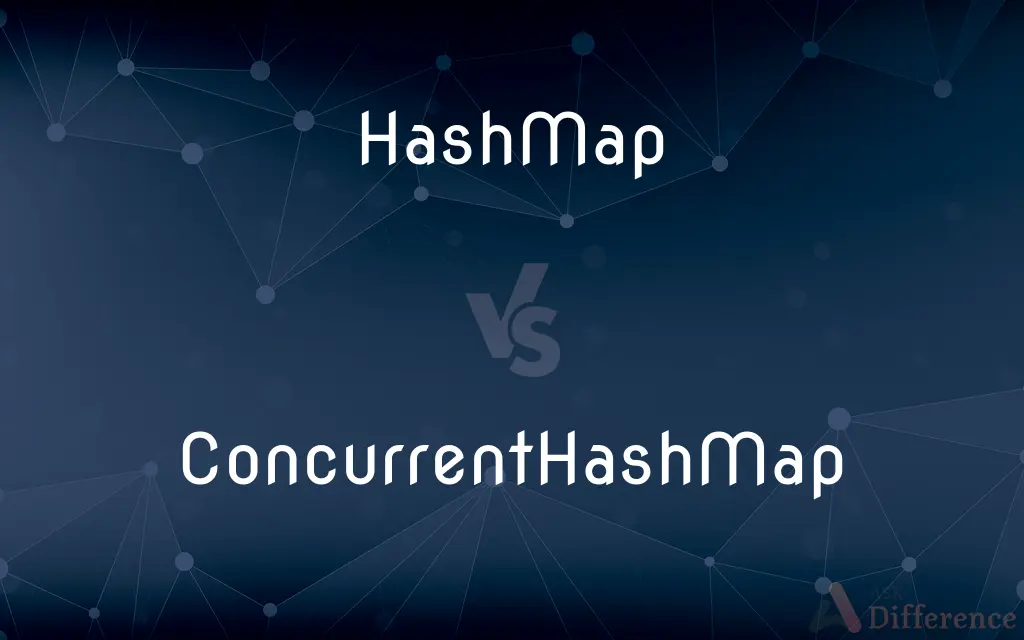HashMap vs. ConcurrentHashMap — What's the Difference?
By Tayyaba Rehman — Published on January 2, 2024
HashMap is a non-thread-safe key-value map; ConcurrentHashMap is thread-safe and allows concurrent read/write access.

Difference Between HashMap and ConcurrentHashMap
Table of Contents
ADVERTISEMENT
Key Differences
HashMap is a part of the Java Collections Framework and allows null values and a null key, while ConcurrentHashMap is a concurrent collection class that does not allow null values or null keys. ConcurrentHashMap is thread-safe, providing a higher performance in multithreaded environments.
In a HashMap, the structure is not synchronized and can be accessed by only one thread at a time if external synchronization is used. ConcurrentHashMap, on the other hand, is designed for concurrent access, allowing multiple readers and a set number of writers to work concurrently.
When a HashMap is iterated, the results can be unpredictable if the structure is modified concurrently. Conversely, iterators of ConcurrentHashMap are weakly consistent, meaning they reflect the state of the map at the point of the iterator's creation.
For performance in a single-threaded context, HashMap is typically faster due to its non-synchronized methods. ConcurrentHashMap provides slightly lower performance in single-threaded contexts but excels in multi-threaded scenarios by minimizing locking and allowing concurrent threads to access the map.
Modifying a HashMap in a multi-threaded environment without proper synchronization can lead to data corruption. ConcurrentHashMap uses several locks on the map's segments to ensure that concurrent modifications are safe and do not result in data inconsistency.
ADVERTISEMENT
Comparison Chart
Thread Safety
Not thread-safe without external synchronization
Thread-safe by design
Null Values
Allows one null key and multiple null values
Does not allow null keys or null values
Iterators
Fail-fast on concurrent modification
Weakly consistent iterators
Concurrency Level
None, or externally synchronized
Built-in support for concurrent access
Performance
Faster in single-threaded use
Optimized for concurrent multi-threaded use
Compare with Definitions
HashMap
Does not maintain any order of its elements.
String first = map.get(1);
ConcurrentHashMap
Maintains a list of segments for concurrent writes.
Int size = map.size();
HashMap
Allows storing pairs of keys and values.
Map.put(1, one);
ConcurrentHashMap
Does not permit null keys or values to ensure thread safety.
Map.getOrDefault(1, default);
HashMap
Permits null values and a single null key.
Map.put(null, nullValue);
ConcurrentHashMap
Handles data in a way that allows concurrent processing.
Map.putIfAbsent(1, one);
HashMap
Needs to be synchronized externally for thread safety.
Synchronized(map) { map.put(2, two); }
ConcurrentHashMap
A concurrent, thread-safe version of a hash map.
ConcurrentHashMap map = new ConcurrentHashMap<>();
HashMap
A map based on hashing of keys.
HashMap map = new HashMap<>();
ConcurrentHashMap
Iterations reflect the state of the map at iterator creation.
For (Map.Entry entry : map.entrySet()) { /* ... */ }
HashMap
Alternative spelling of hash map
Common Curiosities
How does ConcurrentHashMap handle concurrency?
It segments the data, allowing concurrent reads and writes.
Is ConcurrentHashMap slower than HashMap?
In single-threaded applications, yes, due to overhead for thread safety.
Can a HashMap be used in multi-threaded applications?
Yes, but it must be synchronized externally to avoid corruption.
Does ConcurrentHashMap allow null values?
No, it does not permit null keys or null values.
Can ConcurrentHashMap improve performance in concurrent applications?
Yes, it's designed to optimize concurrent access.
Is HashMap ordered?
No, it does not guarantee any specific order of its entries.
What happens if I modify a HashMap while iterating?
You'll get a ConcurrentModificationException.
Are the size methods of both HashMap and ConcurrentHashMap always accurate?
ConcurrentHashMap’s size method gives a close estimate, while HashMap’s size is always accurate.
Can I get a consistent iteration with ConcurrentHashMap?
Yes, iterators are weakly consistent and do not throw ConcurrentModificationException.
Which map should I use for read-intensive multi-threaded tasks?
ConcurrentHashMap is optimized for such scenarios.
How to synchronize a HashMap in a multi-threaded environment?
Use Collections.synchronizedMap(new HashMap<>()) or explicit synchronization.
Are there any alternatives to ConcurrentHashMap for concurrency?
Yes, other concurrent collections like ConcurrentSkipListMap can be alternatives depending on the use case.
Is it safe to iterate over a ConcurrentHashMap without locking?
Yes, you can safely iterate over it without further synchronization.
Can I replace elements conditionally in both maps?
ConcurrentHashMap provides atomic methods like replace() for this; with HashMap, you need to manage synchronization.
How do I ensure thread safety when using a HashMap?
Manually synchronize the critical section, or use a wrapper like Collections.synchronizedMap.
Share Your Discovery

Previous Comparison
Damped Vibration vs. Undamped Vibration
Next Comparison
Salad Fork vs. Dinner ForkAuthor Spotlight
Written by
Tayyaba RehmanTayyaba Rehman is a distinguished writer, currently serving as a primary contributor to askdifference.com. As a researcher in semantics and etymology, Tayyaba's passion for the complexity of languages and their distinctions has found a perfect home on the platform. Tayyaba delves into the intricacies of language, distinguishing between commonly confused words and phrases, thereby providing clarity for readers worldwide.














































